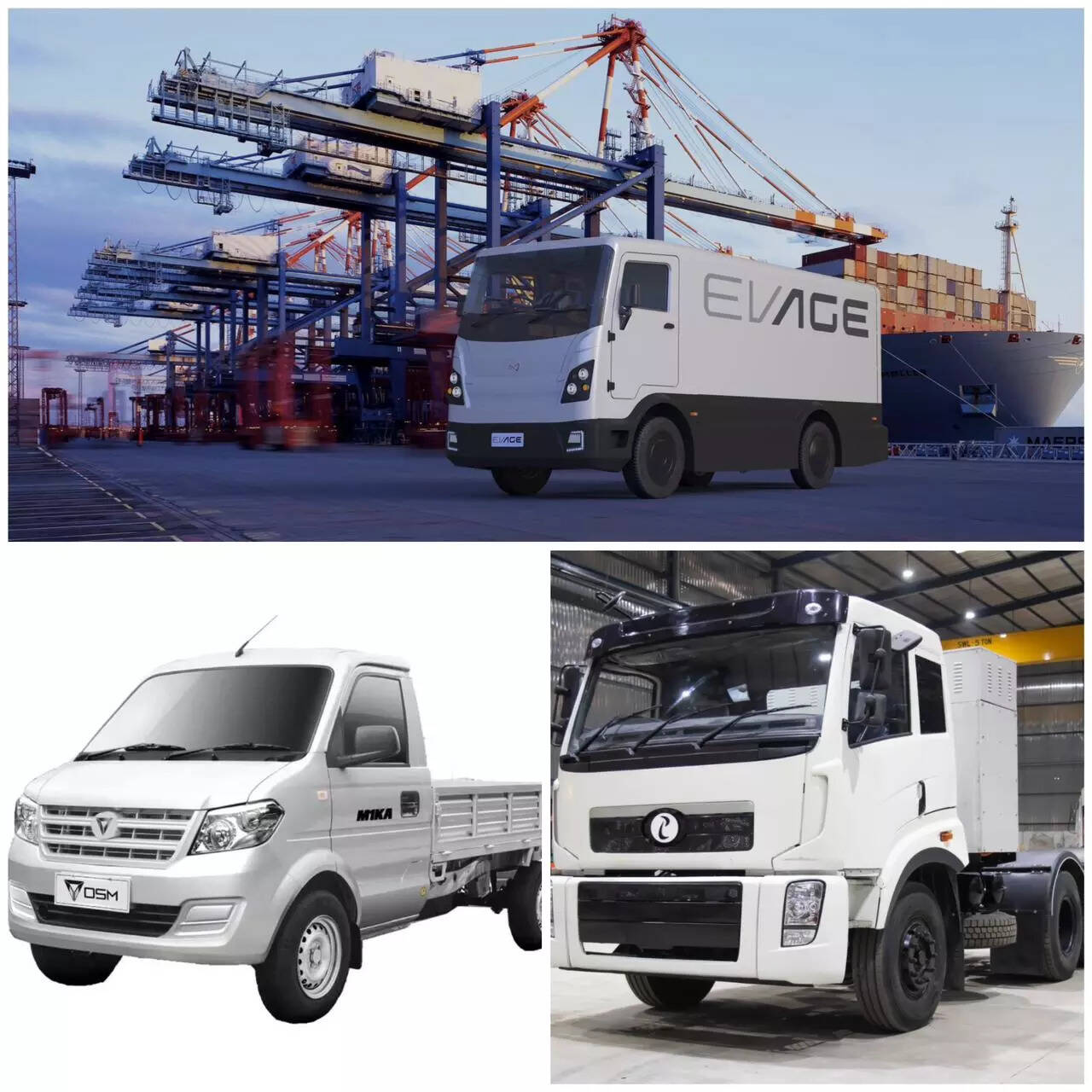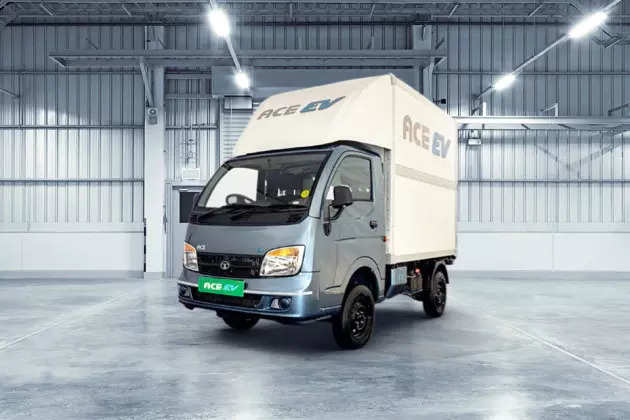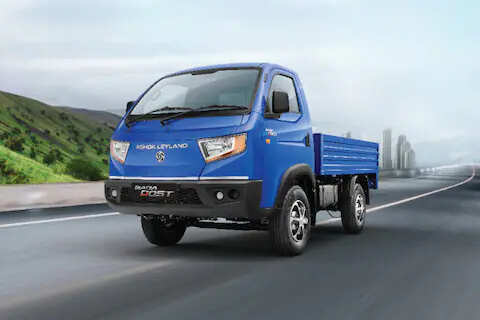Tier I supplier turns OEM
The first product is a 55-tonner, the first unit of which has been delivered a few days ago. Launching an electric heavy truck is a contrarian approach as largely the industry’s view is that battery electric vehicle (BEV) technology is not a economically viable option for that segment, but Hydrogen fuel cell technology is. Even commercial vehicle market leader Tata Motors is starting its EV journey with the electrified version of its Ace small truck.
IPL Tech may be aiming at creating some disruption with a top-down strategy. The 55-tonner is planned to be followed by products in the 40 and 20 tonne segments. “And then we look at other segments,” KK Paul, MD, TI Clean Mobility, told ETAuto.
I can take out the battery cost. Then, what are you comparing (with non-EV options) on costs? The three hurdles for EV adoption are, range anxiety, high upfront cost, and resale value. So, now if one can demystify these and have proper solutions, one is home. Where actually is the problem?~
Anurag Dubey, who joined IPL Tech Electric as senior VP and COO will be responsible for building the new business. He moved to the company last month, after stints in senior positions at Tata Motors, and Mahindra Truck and Bus.
Explaining the thought process behind the contrarian approach, Paul said, “I can take out the battery cost. Then, what are you comparing on costs? The three hurdles for EV adoption are, range anxiety, high upfront cost, and resale value. So, now if one can demystify these and have proper solutions, one is home. Where actually is the problem?”
The company, which started a renewed EV journey first with a 3-wheeler, said, it has got leasing companies ready to lease out the electric trucks. In the trucking industry, where TCO is the key driving factor for sales, Paul expects the electric 55-tonner to have 1/5th the running cost of a diesel truck, and 1/4th of a CNG truck when it comes to fuel expenditure, the single largest cost component for a trucker.
TI Clean Mobility claims that it has received orders for the truck. While the current facility in Faridabad will be used to roll out the trucks in the initial stage, a new facility is planned to be commissioned in Manesar by April next year. The plant “will start with a capacity for around 250-300 trucks a month,” the company said.
A decade ago, the INR 54,000 Murugappa Group had dabbled with electric two-wheelers but failed. In a different environment now, the EV plans straddle across three-wheelers, tractors, and trucks. No two-wheelers this time though. Fund for the new business is “not so much of a problem for us,” Paul said, as the Chennai-based Group wants to have a “substantial chunk” of the business from EVs. The free annual cash flow of “between INR 400 crore and INR 500 crore” in Tube Investments (parent of TI Clean Mobility) will also be there to tap. “The view we have taken is, in any time that we do an investment we don’t do more than two years of our free cash flow,” Paul said.
Startup EVage to launch small truck
By April, EVage, a standalone EV startup based in Chandigarh, will also roll out its first truck. But unlike IPL Tech, EVage will start its journey with a one-tonner, which is scheduled to be unveiled next month. With a plan to gradually expand its presence in the cargo carrier segment, the engineering team at EVage, now with 130 members, has developed a patented ‘exoskeleton’ platform architecture for high modularity. “Essentially, it’s like a skateboard meets a Lego puzzle meets a rubber band. So, you can on the same platform create multiple top hats,” Inderveer Singh, Founder & CEO, EVage Ventures, told ETAuto.
Called the FR8, the cargo carrier, based on the so claimed “first truly native EV platform in India” will pitch itself to largely the same prospective customer base that the electric version of the small truck segment creator Tata Ace will pitch to. EVage doesn’t see itself as a direct competitor to Tata Motors in the electric small commercial vehicle space, but wants the FR8 to have a “technical lead over the competition”.
Evage raised USD 28 million in January this year. Any further fundraising will be after the start of the maiden model’s commercial production. “There’s enough cash in hand for us to skip through to production,” Singh said.
EVage is building an option for the light cargo carrier to be fast charged fully in a claimed 20 minutes. Multiple driving range options are expected to be offered, with one potentially offering 200 km. “You don’t need to increase the cost of the vehicle if you have to go 500 km. You simply charge it three times, four times depending upon your duty cycle. And I guess 20 minutes is a lunch break everybody affords,” says Singh.
The Tata Ace EV has a certified 154 km driving range on a full charge. On a fast charger the small truck takes a little over 100 minutes for a 0-80% SoC (state of charge). Market trials for the EV are underway in Gurugram and Pune. The CV market leader has signed an MoU with Amazon, BigBasket, Flipkart and their logistics partners for delivery of 39,000 Ace EVs.
EVage says it has also secured orders for a “few thousands” of the FR8. Amazon is also among its list of customers. The startup has Toshiba as the supplier of lithium titanium oxide (LTO) cells for its EVs. The advantage of the technology is it offers faster charging than other Lithium-ion batteries, but has a lower energy density.
“Our battery packs will have 10,000 cycles on the vehicle, and maybe 20-30 years as a stationary application. So what we offer is a battery pack that could last for maybe 30-50 years, through different stages of its life, says Singh. The longer the life of a battery, the less the environmental impact.
OSM also on the truck line
Like Singh, Uday Narang, Founder and Chairman of Omega Seiki Mobility (OSM), is also bullish about the small commercial vehicle segment to be the driver for EV adoption in the truck industry. “I see over the next five years, a 30% to 40% penetration of electric trucks in the one tonne segment, which is the sweet spot at 300,000 vehicles a year,” Narang told ETAuto.
OSM has joined hands with a Thai EV technology partner to set up an R&D centre in the Southeast Asian country. Market tests of its one ton truck is scheduled to start this year, with a plan for market rollout by March next year. A 3-tonner is also planned to be launched around the same time. OSM plans to follow that with a 6.5 tonner “but in smaller quantities”. “Our focus initially is on the one tonne because that is where the sweet spot is,” Narang said.
OSM, which is among the key players in the domestic electric three-wheeler market, is in talks with potential investors to raise USD 100 million. It plans to make an overall investment of USD 350 million to execute its ambitious plans in the EV industry. Narang said around USD 250 million of it will be raised through debt, and the total amount will be invested over the next two years or so.
We expect the salience of eSCVs to be a healthy double digit by the end of this decade~
OSM’s ambition is to tap the electrification megatrend and be a global player. It has set up a base in about 10 countries so far. Whether Narang will achieve his earlier stated goal of OSM becoming the Tesla of electric commercial vehicles, time will tell, but for now he’s on an aggressive growth mode.
Opportunities for new players, investors
The lower entry barrier to the EV industry, and the governments’ policies to promote the industry make it attractive not only for new players, startups and conglomerates alike, but also for investors.
Saket Mehra, Partner and Auto Sector Leader at Grant Thornton Bharat, points out that over USD 900 million has been invested through 26 deals in the EV space during the first 9 months of the current year.
However, there could also be consolidation in the EV industry if the new players’ strategies don’t have adequate focus on the right areas. “A strategic focus on key areas such as supply chain resilience, battery and charging innovation, continuous research and development, will be pivotal for the startups to create an impact and resolve existing gaps in the truck segment,” Mehra said.
Charge of the electric trucks
As a new breed of truck makers wait on the wings to enter the market, the majors will also do their moves to not only tap the EV trend but also to protect and grow their turf. While eventually every truck OEM is likely to have a fair share of electrics in its portfolio, some are taking the lead. After Tata Motors, Ashok Leyland is also set to debut in the electric truck space with the e-Dost, scheduled for a market launch through its EV subsidiary Switch Mobility in the first quarter of FY24.
Like Tesla in the US, Tata Motors is also set to start its market journey with electric trucks soon. Deliveries of the Ace EV will begin this quarter. The CV major sees “penetration building up progressively in the electrification of the last-mile delivery segment” and believes “it will not be prudent” to predict the share of electrics in the trucking space in the near term. “That said, we expect the salience of eSCVs to be a healthy double digit by the end of this decade,” Vinay Pathak, VP, Product Line, SCV and PU, Tata Motors, said.
Collaboration for e-trucks: a win-win deal?
As the electrification megatrend grows, collaboration is increasingly becoming the name of the game in the auto industry. And there could be cases for collaboration between/among new and established truck makers too. “A strategic collaboration between startups and legacy players will be most beneficial for the sector. With legacy players providing support with capital, and startups helping them with keeping up with the latest trends in the mobility sector, this will help the electric truck ecosystem evolve across the value chain in a sustainable manner,” Mehra said.
Read More:


















